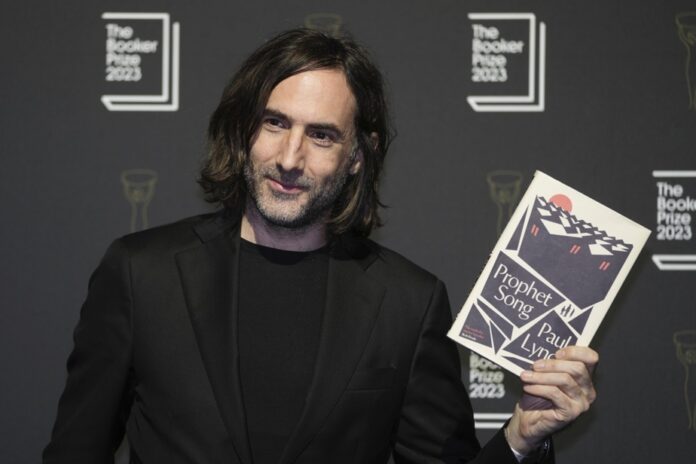(London) Irish writer Paul Lynch won the Booker Prize for best fiction on Sunday with what judges called a “shattering” novel about a woman’s struggle to protect her family as Ireland s collapses into totalitarianism and war.
Prophet Song, set in a fictional dystopian version of Dublin, received the literary prize of 50,000 pounds (approximately 85,850 CAD) at a ceremony in London. Canadian writer Esi Edugyan, who chaired the jury, said the book is “a triumph of emotional, invigorating and courageous storytelling” in which Mr. Lynch “achieves linguistic feats that are astounding to read.”
Paul Lynch, 46, was favorite to win the prestigious award, which usually brings a big boost in sales. Her book beat five other finalists from Ireland, the UK, the US and Canada, chosen from 163 novels submitted by publishers.
Mr. Lynch called Prophet Song, his fifth novel, an attempt at “radical empathy” that attempts to immerse readers in the experience of living in a collapsing society.
“I was trying to see what is happening in modern chaos,” he told Booker.
“Unrest in Western Democracies. The Syria problem: the implosion of an entire nation, the scale of the refugee crisis and the indifference of the West. I wanted to deepen the reader’s immersion to such a degree that by the end of the book, they would not just know, but experience this issue for themselves,” he continued.
The five judges came together to decide the winner on Saturday, less than 48 hours after far-right violence erupted in Dublin following a stabbing attack on a group of children.
Ms. Edugyan clarified that immediate events did not directly influence the choice of winner. She said Mr. Lynch’s book “captures the social and political anxieties of our current moment” but also deals with “timeless” themes.
The other finalists were The Bee Sting by Irish writer Paul Murray; This Other Eden by American novelist Paul Harding; Study for Obedience by Canadian author Sarah Bernstein; If I Survive You by the American writer Jonathan Escoffery; and Western Lane by British author Chetna Maroo.
Edugyan said the choice of winner was not unanimous, but the judges’ meeting, which lasted six hours, was not acrimonious.
“In the end, we all felt that this was the book we wanted to present to the world and that it was truly a masterful work of fiction,” she commented.
Founded in 1969, the Booker Prize is open to English-language novels from any country published in the United Kingdom and Ireland and has a reputation for transforming the careers of writers who win it. Previous winners include Ian McEwan, Margaret Atwood, Salman Rushdie and Hilary Mantel.
Paul Lynch received his trophy from last year’s winner, Sri Lankan author Shehan Karunatilaka, at a ceremony at Old Billingsgate, a grand old Victorian fish market in central London.
The evening included a speech by Nazanin Zaghari-Ratcliffe, an Anglo-Iranian imprisoned in Tehran for almost six years until 2022 on allegations of plotting to overthrow the Iranian government – an accusation she, her supporters and groups rights defenders denied.
She talked about the books that sustained her in prison, including Ms. Atwood’s The Handmaid’s Tale, set in an oppressive American theocracy.
“Books helped me find refuge in other people’s worlds when I was unable to create one myself,” Zaghari-Ratcliffe said. They saved me by being one of the few tools I had, along with my imagination, to escape the walls of Evin without physically moving. »















